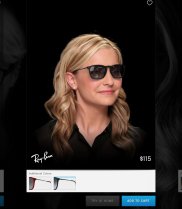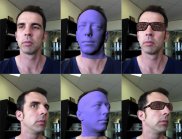Does my virtual forehead look big in this?
The days of stalling online purchases in fear of products “not quite looking like they did on the model” could soon be out of fashion according to new research by Aussie scientists.
CSIRO, Australia’s national science agency, today announced it has filed a series of patents for its new Smart Vision research. Enhancing the ‘virtual change room’, the technology interprets 2D pixels from an image of a human face such as the left eye corner or tip of the nose and turns them into a real-time 3D face-sensing device.
“Our computer modelling experts have developed a more accurate and reliable way to create a 3D scan of a person’s face using newly developed algorithms that can turn 2D images from a mobile camera into a 3D model of the face.”
Dr Simon Lucey, Group Research Leader, CSIRO Computational Informatics
“While pictures can tell us a thousand words, they certainly don’t tell us the whole story,” said Simon Lucey, Group Research Leader for CSIRO’s Digital Productivity and Services Flagship.
“Our computer modelling experts have developed a more accurate and reliable way to create a 3D scan of a person’s face using newly developed algorithms that can turn 2D images from a mobile camera into a 3D model of the face. The technology calculates size so unlike other virtual try-on technologies, customers can try on and view products from any angle — perfectly scaled to their face.”
Through its Digital Productivity and Services Flagship, CSIRO has exclusively licensed the new Smart Vision technology to Glasses.com, an online eyewear retailer, for use in the optical industry. Glasses.com has combined this research with other developed technology to create an interactive app which allows customers to accurately see how frames fit without ever stepping into a store.
The unique facial mapping software allows the app to produce a true-to-life 180° view of the user’s face showing how each pair fits in 3D and letting shoppers compare side-by-side images of each style. Because the technology places a 3D model of the glasses over a 3D rendering of the user’s face, shoppers can even reposition the glasses, tapping the screen to ‘slide’ frames up and down the bridge of their nose just as they would in real life.
“We didn’t want to just replicate the offline shopping experience – we wanted to improve it. Throughout the development stages, we’ve worked to create a tool that’s so true-to-life it’s not only fun, but actually useful in making a purchasing decision,” said Jonathan Coon, CEO of glasses.com’s parent company 1-800 CONTACTS.
“Up until now, augmented reality was something of a parlour trick. It was fun but just not accurate or easy enough to be useful. Our hope is that the glasses.com app will be to augmented-reality shopping what ‘Toy Story’ was for computer-generated animated films – it’s just the beginning,” he said.
Peak retail industry body the Australian Retailers Association (ARA) said the new Smart Vision research is another example of why retailers need to take action to transform their business models for the digital age by embracing new technologies.
“Retailers need to move to hybrid business models that combine the strengths of today’s online and bricks-and-mortar strategies,” said ARA Executive Director Russell Zimmerman.
“With predictions that by 2025, a leading retailer will make A$106 billion more in sales and sell 40 per cent of its goods online, it is becoming increasingly evident that success will be driven by how effectively retailers can harness the power of new technologies to deliver unique value to customers with the speed, efficiency and ubiquity they demand.”[1]
More information about CSIRO’s Smart Vision research.



